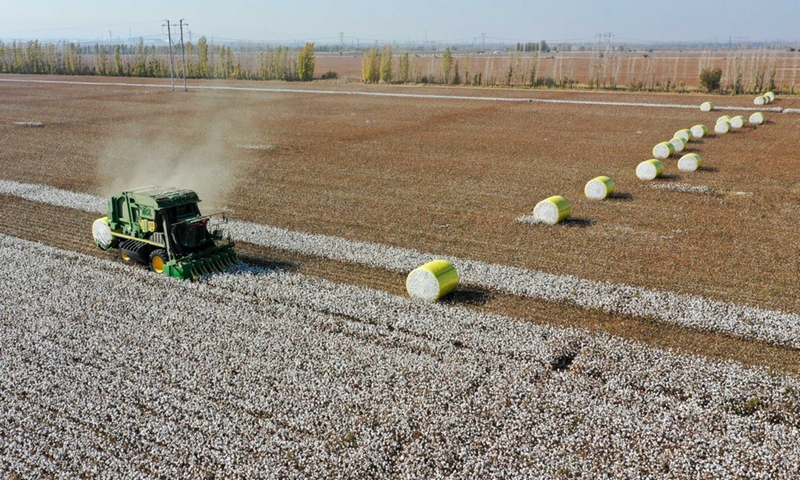More countries oppose US, West’s politicization of human rights in China’s Xinjiang region at UN

A cotton harvesting machine works in a field in Manas County, Hui Autonomous Prefecture of Changji, northwest China's Xinjiang region. File photo: Xinhua
More countries have expressed opposition to US and Western countries' politicization of human rights issues as the latter's fierce hyping of topics on China's Xinjiang region during the ongoing 51st session of the United Nation Human Rights Council and the UN General Assembly made more developing countries see clearly the hypocrisy of the US and the West, analysts said, pointing out that China and a wider group of countries will work together to defend true multilateralism and resist US hegemony which is under the guise of human rights.
On Monday, the US and a small group of Western counties, including Britain, Canada, Denmark Finland, Iceland, Norway and Sweden presented a draft proposal at the ongoing 51st session of the Human Rights Council to hold a special debate over the human rights situation in China's Xinjiang region at the council's next session in early 2023, media reported.
On the same day, on behalf of nearly 70countries, a representative from Pakistan made a joint statement at the Human Rights Council to call on other countries to stop interfering in China's internal affairs on Xinjiang, Hong Kong and Xizang regions. They also opposed the politicization of human rights and double standards, or interference in China's internal affairs under the pretext of human rights.
Moreover, more than 20 countries also made statements to support China's stance at the Human Rights Council, making the total number that voiced understanding and support for China to nearly 100.
In response to the move by the US and some Western countries, Chinese Foreign Ministry Spokesperson Wang Wenbin said on Tuesday that certain Western countries use the Human Rights Council as a tool for political manipulation. They blatantly apply double standard and have gone so far as to name and shame some developing countries and openly pressure them.
This has poisoned the atmosphere and led to aggravated confrontation at the Human Rights Council, which is detrimental to international human rights cooperation, Wang Wenbin said.
He also noted that the fact that nearly 100 countries have expressed their understanding and support for China's legitimate position in various ways at the Human Rights Council showed that the attempts of a handful of Western countries to use so-called human rights issues to attack and smear China have failed time and again. This speaks volumes about who enjoys broad support and who doesn't.?
It is frequent to see similar battles between a small number of countries in the US-led West and more countries including China and developing countries over human rights topics and especially the battle centering on China's Xinjiang region at UN platforms, particularly the Human Rights Council, as more countries are standing out to expose the notorious human rights record of the US and the West and oppose their hegemony of hyping human rights issues, analysts said.
The draft proposal, if approved would mark the first time that human rights concerns in China have been formally put on the UN Human Rights Council's agenda - this is the latest move the US and the West have made to further smear China's policies in the Xinjiang region, an expert on human rights issues who asked for anonymity, told the Global Times.
By pushing the draft proposal, the US and some Western forces are making preparations to require a larger-scale of "investigations" on China's Xinjiang region by other UN human rights treaty bodies and special rapporteurs, including the Committee against Torture, Committee on Enforced Disappearances and rapporteurs on forced labor, said the expert.
Moreover, the US and the West are using the draft proposal to test the new High Commissioner on his cooperation to them on topics on the Xinjiang region as they are not fully satisfied with the previous UN High Commissioner's report on Xinjiang, said the expert.
The Office of the High Commissioner for Human Rights (OHCHR) released "an assessment report" on China's Xinjiang region on August 31. China said the report was "completely invalid" and "a political tool" serving the US and some Western countries to contain China.
The report came after the US and some Western countries as well as anti-China forces imposed huge pressure on former UN human rights chief Michelet Bachelet before and after her visit to China's Xinjiang region. She later announced not to seek a second term as a High Commissioner. According to UN news release, Volker Türk of Austria was appointed by UN Secretary-General Antonio Guterres on September 8 as successor to Bachelet.
Even for such a "report" with no credibility and legitimacy, it dares not to play up the fallacies of "forced labor," "genocide," "religious repression," and "forced sterilization," which apparently showed that the lie of the century cooked up by the West has bankrupted, and the West has shot itself in the foot, analysts said.
Aside from the 51st session of the Human Rights Council, the US and some Western forces are also hyping topics related to China's Xinjiang region at the 77th UN General Assembly (UNGA). For example, anti-China NGOs together with some diplomats from Western countries are organizing events on the sidelines of the UNGA to pressure the UN to take actions toward China over its policies in the Xinjiang region. US President Joe Biden also mentioned China's Xinjiang region in his speech to the UN high-level general debate on September 21.
The anonymous expert pointed out that as China has refused any investigation with presumption of guilt, the US and some Western forces will encourage NGOs and special rapporteurs to organize more anti-China activities in countries around China, especially in Central Asia.
Moreover, separatists from China's Xinjiang region and terrorist organizations may also collude with the US to coax or buy over more overseas ethnic individuals to play as victims from the Xinjiang region, the expert warned.
The US and some Western countries are manipulating the UN platforms by using human rights issues as weapons to attack developing countries. Their hyping on China's Xinjiang region is just the latest example - by continuous hyping of Xinjiang topics at UN platforms and on mainstream media, they are spreading disinformation of the Xinjiang region to further fool people in their own countries, said Wang Jiang, an expert at the Institute of China's Borderland Studies at Zhejiang Normal University.
Wang also noted that the US and some Western countries could also cite the so-called concerns over human rights in Xinjiang to push anti-China bills and further pressure more companies to decouple with China.
For example, in December 2021, the US passed the so-called Uyghur Forced Labor Prevention Act (UFLPA) to ban all products from China's Xinjiang region, which was widely described as an "evil bill" by observers as it fully exposed the US hegemony under the guise of human rights and severely undermined the stability of the global chain.
Analysts pointed out that although using human rights issues as weapons to attack other countries have become tactics that have been frequently used by the US and some Western forces, their recent fierce hyping of topics about China's Xinjiang region still makes more countries become vigilant, with many expressing their opposition to such moves.
What the US and the Western forces have done to China may occur to any other developing countries when the US deems them as "rivals," said Wang Jiang, noting that this is also why China and more developing countries are working together to support each other on issues related to their core interests and also called for the Human Rights Council and the UN to uphold true multilateralism and resist hegemonic pressure from the US.
Last week, on behalf of more than 30 countries, Chen Xu, China's permanent representative to the UN Office in Geneva, urged the protection of countries' rights to choose their path for development independently. He also opposed the interference in other countries' internal affairs, unilateral sanctions without basis in international law, and the politicization and marginalization of the development issue.
Anna Malindog-Uy, an expert on international relations from the Philippines, told the Global Times in a previous interview that in recent years, the international community has gained a clearer knowledge that the "human rights" clamored for by the US and the West do not fit the interests of most of other countries.
The expert called for China and other developing countries to improve communication on human rights and put development, security and other factors into the criteria of human rights to form a comprehensive concept of human rights to counter the hypocritical human rights moves of the US and the West.
Another expert who works for the Human Rights Council and asked for anonymity, told the Global Times that while the US and the West are trying to exert more influence, developing countries have more active engagements in internal human rights governance and increasing influence in related bodies.
The notorious human rights record of the US and some Western countries has also been lashed out at meetings of the human rights council with many countries urging the High Commissioner to conduct investigations on their crimes either in their own country or countries they have brought wars and chaos, said the expert.
On Thursday, Jiang Duan, minister of the Chinese mission to the UN in Geneva, harshly condemned US' illegal military interference in Syria and urged it to stop violating the Syrian people's basic human rights. Jiang's condemnation is the latest against the US and some Western countries' shameful human rights record as more countries, including China, criticize them for imposing unilateral sanctions and violating human rights in their own countries and across the Middle East.

